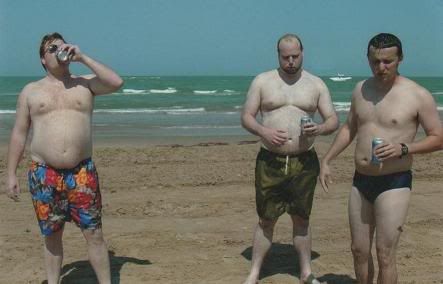Another triumph of neo-etymology from the hard-thinkin' Derek:
"The neo-etymology of schooner is clear. To understand it, we must delve into both Old Middle German and a fascinating episode of Hanseatic history. It was in 1557 that Prince Jåren of Heisling, in what is today western Denmark, banned fermentation of wheat in his realms, as his subjects had become besotten, often struding about drunkenly, raiding their neighbors and each other. This immediately set into motion a rivalry between a number of seafaring factions in Bremen town to control the Heisling beer smuggling market. Competition quickly led to refinement of ship design, striving for ease of sailing operation (OMG schonen: to spare resources), speed, and beauty (OMG schön: beautiful). The Bremeners came to call these swift vessels "schöne schonende Schiffe" (beautiful ship that is sparing of resources), or schon-schons. This nickname carried over in the western Danish dialects as skoon-skoon (commonly called skoon-skoon-skoonies in the taverns), shortened to schooner in order to deceive the prince's agents. The performance of the schooner is commonly credited with forcing Jåren's successor Prince Dagmar to repeal the beer ban in 1596. Incidentally, our second definition of the word schooner derives from the practice of toasting a vessel's successful arrival, sampling the cargo with with a large, wide glass, often 22 oz. in size. In time, the glass came to be known by the same name as the ship that brought its contents."
Subscribe to:
Post Comments (Atom)

1 comment:
In Australia, 'schooner' is very common as a beer glass of 425ml. Attached to the drinking cultures of New South Wales and other states, are other classic drinking terms, probably linked to this origin. To 'scull' a beer is to down it very quickly: think here of the solo boat-racing sport sculling. The term 'boat race' is used occasionally to signify a competition between 2 or more drinkers of beer to see who can scull the fastest. Mighty fascinating, in my opinion, that the beer drinking culture in Australia is inextricable with boating terms. Is there any work done on this, I wonder?
Post a Comment